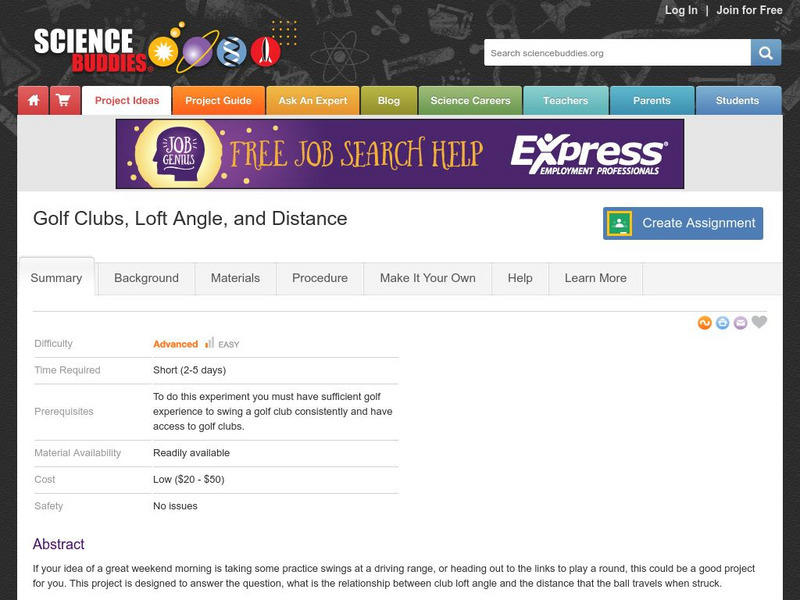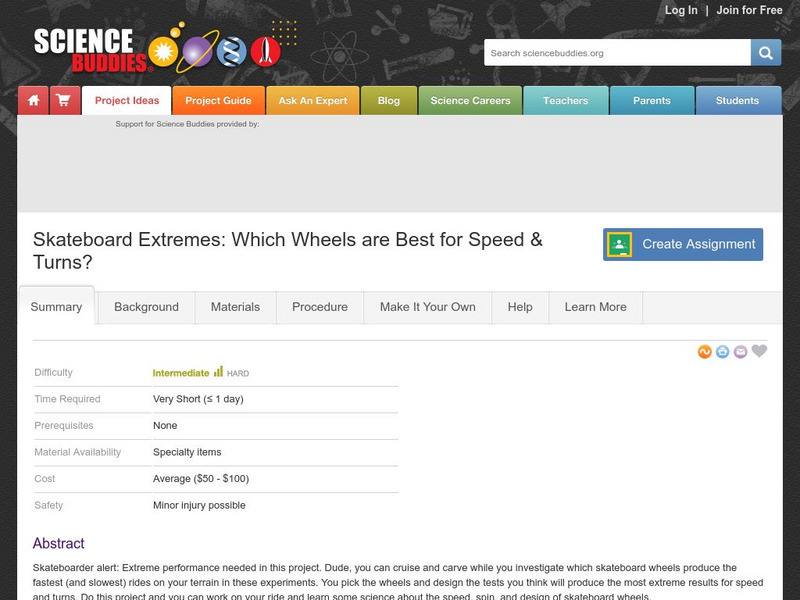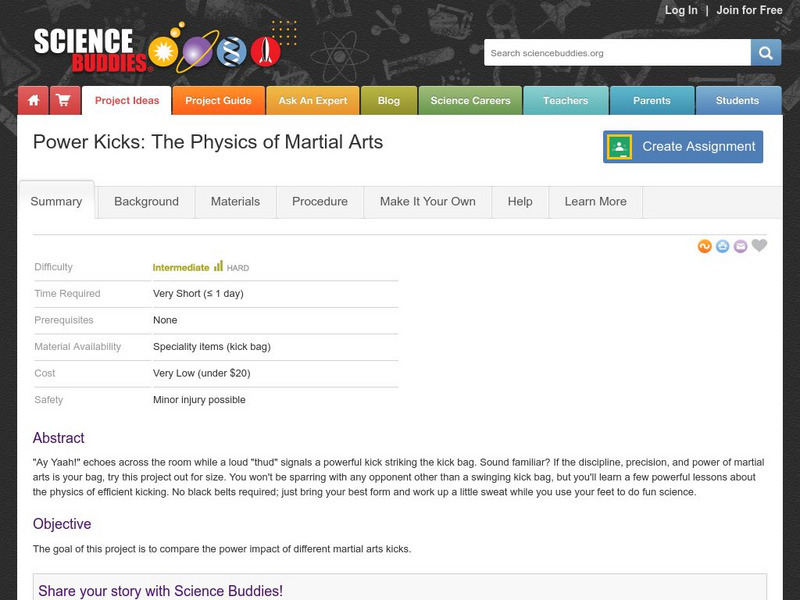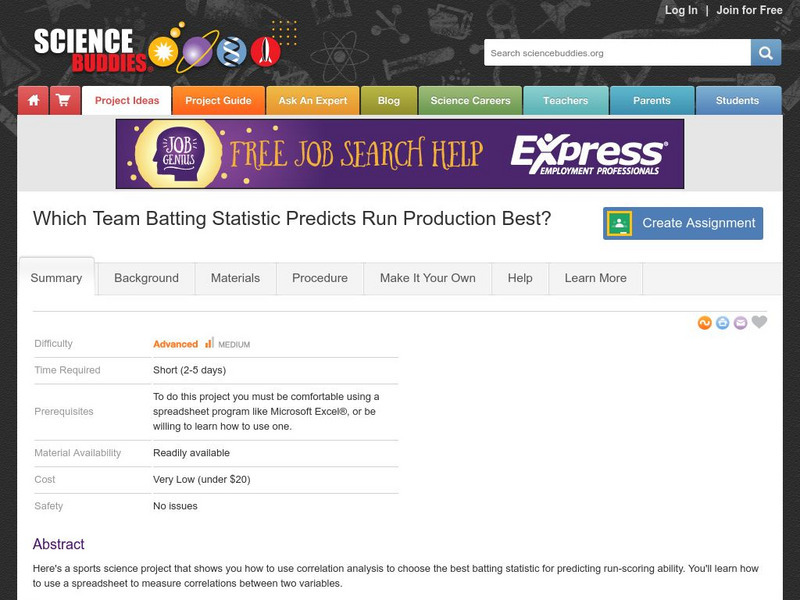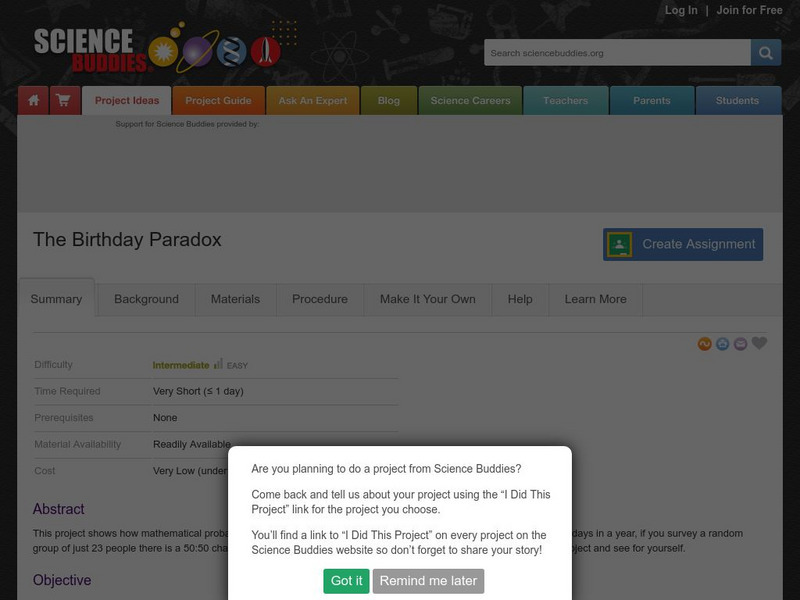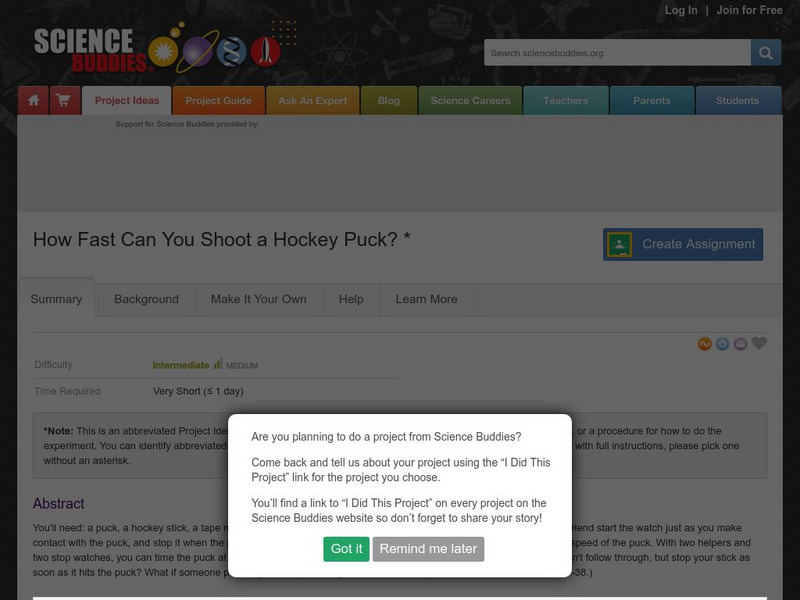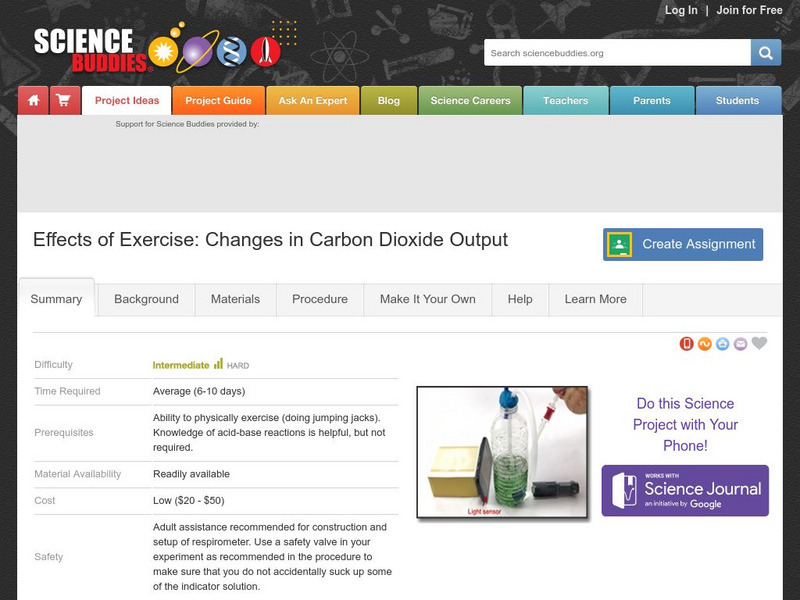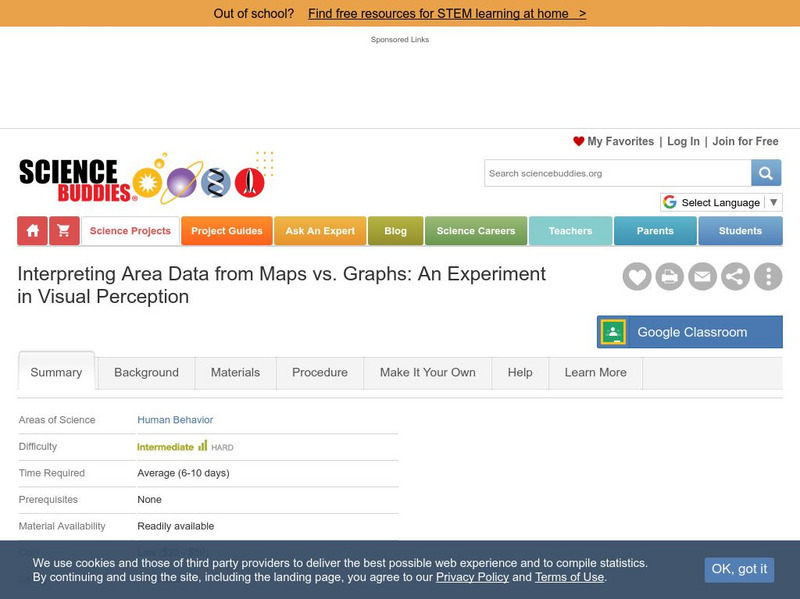Science Buddies
Science Buddies: Golf Clubs, Loft Angle, and Distance
If your idea of a great weekend morning is taking some practice swings at a driving range, or heading out to the links to play a round, this could be a good project for you. This project is designed to answer the question, what is the...
Science Buddies
Science Buddies:skateboard Extremes:which Wheels Are Best for Speed & Turns?
You can cruise and carve while you investigate which skateboard wheels produce the fastest (and slowest) rides on your terrain in these experiments. You pick the wheels and design the tests you think will produce the most extreme results...
Science Buddies
Science Buddies: Power Kicks: The Physics of Martial Arts
If the discipline, precision, and power of martial arts is your bag, try this project out for size. You won't be sparring with any opponent other than a swinging kick bag, but you'll learn a few powerful lessons about the physics of...
Science Buddies
Science Buddies: Pedigree Analysis: A Family Tree of Traits
Some characteristics, like the shape of your hairline, whether your earlobes are attached or detached, and whether or not you have freckles are inherited from your parents. In this science project you will learn about Mendelian traits,...
Science Buddies
Science Buddies: How Much Dna Can You Pack Into a Cell?
This project asks you to find out just how much DNA can be fit into a cell. Whether animals with a bigger genome need a larger cell nucleus to store its DNA is uncertain. However, by trying your hand at this science project you can find...
Science Buddies
Science Buddies: Don't You Fret! Standing Waves on a Guitar
In this project, you will investigate the physics of standing waves on guitar strings. You will learn about the different modes (i.e., patterns) of vibration that can be produced on a string, and you will figure out how to produce the...
Science Buddies
Science Buddies: Make Your Own Electric Guitar Pickup
If you like playing electric guitar, this could be a cool project for you. In this project you'll wind one or more of your own electric guitar pickups and test them out in an inexpensive electric guitar to understand just how electric...
Science Buddies
Science Buddies: Make Your Own Piezoelectric Pickup for Acoustic Guitar
In this project you'll learn how to make a piezoelectric pickup for acoustic guitar using inexpensive components. You can then connect your acoustic guitar to an amplifier, and record your own music. If you are interested in electronics...
Science Buddies
Science Buddies: Guitar Fundamentals: Wavelength, Frequency, & Speed
This is a rockin' project for guitarists with an interest in the physics behind music. If you have ever wondered why the pitch of the note changes when you fret the string, this project will help you understand by applying basic...
Science Buddies
Science Buddies: Are You Gellin'?
Chances are, you have several materials around your house made of gelatinized materials. Gels are used in all kinds of products and materials: pudding, diapers, insoles, packaging, ice cream, toothpaste, and much more. In this project,...
Science Buddies
Science Buddies: Which Team Batting Statistic Predicts Run Production Best?
Here's a sports science project that shows you how to use correlation analysis to choose the best batting statistic for predicting run-scoring ability. You'll learn how to use a spreadsheet to measure correlations between two variables.
Science Buddies
Science Buddies: Baseball Bat Debate: What's Better, Wood or Aluminum?
Science and math abound in baseball. In this project, you can produce some interesting baseball statistics of your own and perhaps settle a long-standing debate. You'll set up experiments at your local playing field to find out which...
Science Buddies
Science Buddies: Nothing but Net: The Science of Shooting Hoops
Swish. What a great sound when you hit the perfect shot and get nothing but net. Here's a project to get you thinking about how you can make that perfect shot more often.
Science Buddies
Science Buddies: Solid Motor Rocket Propulsion
What does it take to launch a satellite to explore Mars, or a mission to the moon? This project has several possible variations for exploring the physics of rockets. This is rocket science.
Science Buddies
Science Buddies: The Birthday Paradox
This project shows how mathematical probability sometimes contradicts our intuition. Despite the fact that there are 365 days in a year, if you survey a random group of just 23 people there is a 50:50 chance that two of them will have...
Science Buddies
Science Buddies: Learning Your A, G, C's (And T, Too)
This is a project about the "molecular alphabet" of DNA. With just four "letters," it manages to keep track of the plan for an entire person, and keep a complete copy in nearly every cell. This project will help you start learning this...
Science Buddies
Science Buddies: How Fast Can You Shoot a Hockey Puck?
In this project, you'll need: a puck, a hockey stick, a tape measure, at least one helper with a stopwatch and an empty rink. Have your friend start the watch just as you make contact with the puck, and stop it when the puck hits the...
Science Buddies
Science Buddies: Paper Chromatography: Advanced Version 1
This project will teach you the basics of analytical chemistry, which is a must for students who want to go into chemistry or materials science. The molecules in objects we see all around us are constantly attracting each other....
Science Buddies
Science Buddies: Using Laser Pointer to Measure Data Track Spacing on C Ds, Dv Ds
You've probably noticed the colorful patterns "reflecting" from the shiny surface of a CD disk. What you are seeing is actually diffraction of white light, and the rainbows of color are diffraction patterns. In this project you'll learn...
Science Buddies
Science Buddies: Now You See It, Now You Don't: A Chromatic Adaptation Project
This project shows that our perceptions can change, even with the stimulus remains the same. A clear color difference in an image disappears after just 20 seconds of looking at another (special) image.
Science Buddies
Science Buddies: Effects of Exercise: Changes in Carbon Dioxide Output
Everybody knows that your body needs oxygen to keep going, and that you breathe out carbon dioxide as waste. What happens when you exercise? You've probably noticed that you breathe faster, and your heart beats faster. What triggers your...
Science Buddies
Science Buddies: Lichenometry: An Accessible Method for Dating Recent History
Geology and archeology are examples of historical sciences. Their practitioners rely on multiple methods for establishing dates and temporal sequences as they seek to construct a history from the available evidence. This project will...
Science Buddies
Science Buddies: Interpreting Area Data From Maps vs. Graphs
Graphical methods of data presentation are a key feature of scientific communication. This project asks the question, "What's the best way to compare the land area of states: a map or a bar graph?" You'll be measuring performance on two...
Science Buddies
Science Buddies: Dry Spells, Wet Spells: How Common Are They?
Here's a project that looks at what the weather was like for over a hundred years. The goal of the project is to compare long-term precipitation patterns in different regions of the country. You will work with historical climate data,...
Other popular searches
- Science Fair Projects Ideas
- Science Fair Projects Topics
- Motion Science Fair Projects
- Coke Science Fair Projects
- Food Science Fair Projects
- Sports Science Fair Projects
- Cool Science Fair Projects
- Csi Science Fair Projects
- Edible Science Fair Projects
- Casi Science Fair Projects


